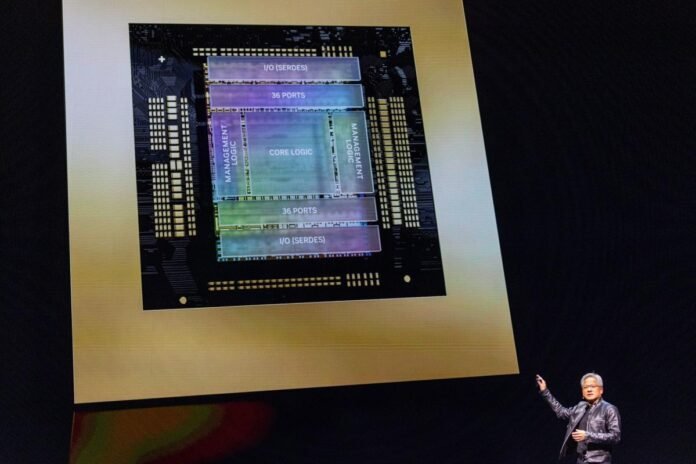(Bloomberg) — Biden administration officials have discussed restricting sales of Nvidia Corp.’s advanced AI chips. and other U.S. companies on a country-specific basis, people familiar with the matter said, a move that would limit some countries’ artificial intelligence capabilities.
Most read from Bloomberg
Listen to the Bloomberg Daybreak Europe podcast on Apple, Spotify or wherever you listen.
The new approach would cap export licenses for certain countries in the interest of national security, said the people, who described the private conversations on condition of anonymity. Officials are focusing on countries in the Persian Gulf that have a growing need for AI data centers and the deep pockets to finance them, the people said.
Deliberations are in their early stages and remain fluid, the people said, noting that the idea has gained momentum in recent weeks. The policy would build on a new framework to ease the licensing process for AI chip shipments to data centers in places like the United Arab Emirates and Saudi Arabia. Commerce Department officials unveiled these regulations last month and said more rules are on the way.
The agency’s Bureau of Industry and Security, which oversees export controls, declined to comment. Nvidia, the market leader for AI chips, also declined to comment, as did Advanced Micro Devices Inc. A representative for Intel Corp., which also makes such processors, did not respond to a request for comment.
Nvidia shares fell more than 1% in premarket trading on Tuesday after the stock closed at a record level on Monday.
A White House National Security Council spokesperson declined to comment on the talks but pointed to a recent joint US-UAE statement on artificial intelligence. In it, the two countries recognized the “tremendous potential of AI for good,” as well as the “challenges and risks of this emerging technology and the critical importance of safeguards.”
Imposing country-based limits would tighten restrictions originally aimed at China’s artificial intelligence ambitions, as Washington considers the security risks of AI development around the world. The Biden administration has already restricted shipments of AI chips from companies like Nvidia and AMD to more than 40 countries in the Middle East, Africa and Asia, fearing their products could be diverted to China.
At the same time, some U.S. officials have come to see export licenses for semiconductors, especially Nvidia chips, as leverage to achieve broader diplomatic goals. That could include asking key companies to cut ties with China to gain access to American technology — but the concerns extend beyond Beijing.
“We will have to have a conversation with countries around the world about how they plan to use these capabilities,” Tarun Chhabra, senior director of technology at the National Security Council, said at a forum in June, without naming specific countries. “When you’re talking about countries that have a really robust internal surveillance apparatus, we have to think about, how exactly will they use these capabilities to boost that kind of surveillance, and what will that look like?”
There is also the question of how global AI development could impact U.S. intelligence operations, said Maher Bitar, another NSC official. “What are the risks, not just on human rights grounds, but also in terms of security and counterintelligence risks for our personnel around the world?” Bitar said at the same event.
It’s unclear how leading AI chipmakers would respond to additional U.S. restrictions. When the Biden administration first issued sweeping chip rules for China, Nvidia redesigned its AI offering to ensure it could continue selling into that market.
If the administration moves forward with country-based caps, achieving a comprehensive new policy in the final months of President Joe Biden’s term could prove difficult. Such rules could be difficult to enforce and would be a major test for U.S. diplomatic relations.
WATCH: Nvidia’s surprising AI Origin story
Governments around the world are seeking so-called sovereign AI – the ability to build and manage their own AI systems – and that pursuit has become a major driver of demand for advanced processors, according to Nvidia Chief Executive Officer Jensen Huang. Nvidia’s chips are the gold standard for data center operators, making the company the most valuable chipmaker in the world and the biggest beneficiary of the AI boom.
China, meanwhile, is working to develop its own advanced semiconductors, although these still lag behind the best American chips. Still, there is concern among U.S. officials that if Huawei Technologies Co. Whether another foreign manufacturer one day offers a viable alternative to Nvidia chips – presumably with fewer strings attached – it could weaken the US’s ability to shape the global AI landscape.
Some US officials argue that this is only a remote possibility, and that Washington should take a more restrictive approach to global exports of AI chips given its current negotiating position. Others warn against making it too difficult for other countries to buy American technology, in case China gains ground and captures those customers.
While officials have debated the best approach, they have delayed the approval of large amounts of AI chip licenses to the Middle East and elsewhere. But there are signs that things may be moving quickly: Under new rules for data center shipments, U.S. officials will vet and pre-approve specific customers based on security obligations of both the companies and their national governments, paving the way for easier licensing in the future. .
–With help from Ian King and Jenny Leonard.
(Adds shares in fifth paragraph.)
Most read from Bloomberg Businessweek
©2024 BloombergLP





